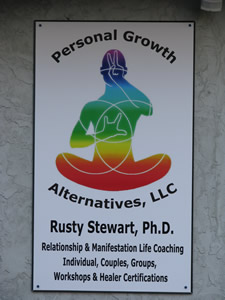
|

Articles Index
Newsletter Information
Newsletter Archives
Healing Products & Services For Purchase
Register For Workshops and Certifications
Directions
Holistic Integrative Breathing CD's and Online Store
Wisdom Of The Earth Medicinal Therapeutic Grade Essential Oils
DVD's Coming Soon!
Holistic Community Circle Links

|

|
Articles
Compassion and Boundaries
by Rusty Stewart, Ph.D.
Can we simultaneously feel compassion and assert healthy boundaries? The answer is yes, but it takes practice, courage, and risk-taking. Many people confuse compassion and caring with enabling and co-dependency. Boundaries are also frequently misunderstood as people think that when they demand a boundary it should automatically be honored. This will usually prove futile resulting in frustration and victimization. Given these foggy interpretations of boundaries and compassion, a closer look at healthy application and successful experience will provide clarity.
Compassion is being able to see and feel the humanness in others while experiencing the mirror of the human condition in ourselves. It is being gentle and patient with oneself and others. Compassion is the full acceptance of the human experience, be it in the self or other beings. It is empathy. In order to feel compassion for others we need to be able to be compassionate with ourselves. This is frequently difficult for many of us because of the ridiculously high expectations we place on ourselves. This turns into a vicious cycle as we are likely to project our frustration of not meeting expectations onto others. And if we struggle with our own compassion, we usually will project that lack of compassion outward.
Healthy compassion does not have an agenda. In other words, if I am a good person I should do this or do that because this person is having problems and difficulties. We need to be able to distinguish enabling and co-dependency from caring and compassion. If we are not taking care of ourselves, we are not caring for others in a healthy way. If we think we are helping someone, but in reality are participating in a familiar pattern of disempowerment and victimization, we are probably partaking in enabling behavior. This is where healthy boundary setting is crucial.
Boundaries must have stated consequences!! If not, they are not boundaries. I frequently have clients that say, I set boundaries but people ignore them. I ask them, what was the consequence of not honoring your boundary? They usually say what do you mean, I just told them over and over again, or I threaten them with ultimatums. Boundaries are taking care of ourselves by stating our needs to another and following through with whatever it takes. Boundaries are not threats, do not need to be emotional, and do not mean we cannot be compassionate at the same time. Let me give you an example of feeling compassion while at the same time asserting healthy boundaries.
I frequently have couples that have difficulties with compassion and boundaries. One person has a drinking problem and his partner has been engaging in enabling behavior for years trying to get him to stop drinking. She has told him over and over again that, "I'm going to leave you if you don't stop drinking." However, she never does it thus there is no consequence and no real boundary. As she does more work on herself with her own healing she finds the ability to be compassionate with herself. She learns how to get her needs met and ask for what she wants. It becomes easier for her to distinguish what serves her best interests and what does not. She is becoming an empowered woman. Next time when she approaches her husband with the drinking problem she is both clear and compassionate when stating her boundary. "I've been doing a lot of work on myself in determining what I need to do to heal and be happy. I now realize that I cannot have alcohol in my life and relationship. I know things have been difficult for you and I'm sorry I have been trying to change you for so many years. I am not telling you to stop drinking. God bless you.You can drink as much as you want. However, I am clear that my needs and requirements do not include alcohol in my relationship and I am removing myself from that environment so I can continue to heal, grow, and honor myself."
Thus she can feel compassion for her husband, but at the same time put up a boundary with real consequences. She is not trying to change him but change herself. She has learned compassion for herself, which opens the door to feel compassion for her husband. She has also learned to take action to take care of herself and stop her enabling behavior with her husband. This breaks a pattern of victimization and disempowerment with both of them. He is freed up to change if he chooses because she has stopped playing the game of enabling co-dependent behavior. She also gets to heal because she is putting her needs first by asserting herself and her boundaries. Whatever happens, the dynamic has been broken between the two of them. This is true forgiveness. This is compassion for self and others. And yes, compassion and healthy boundaries are not mutually exclusive. They are mutually necessary for healthy relations!!
Yoga Living, July/August 2005

|







